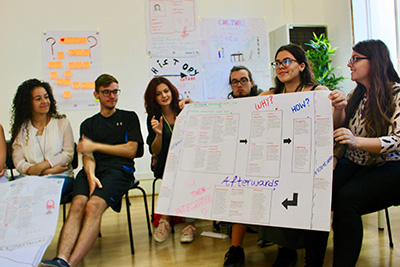
Training Course, Cascais, Portugal, 28 Oct – 5 Nov 2017
By Mary Mehili
We were 20 people from 9 countries of Europe and the Middle East ready to contribute to the learning process of the Training by sharing, discussing and acting on a topic we were all so passionate about: the phenomenon of migration, the refugee crisis, adaptation to otherness, integration and active citizenship.

The journey started with a day full of activities in order to know each other and get a taste of each other’s culture, using creative practices such as games to make us feel comfortable to present ourselves and our countries. Our trainer, Graziano, with the help of the people from the host organization managed to make a perfect atmosphere and preparation for the adventure to start.

The process of understanding the key-elements of the project and the realities of refugees was successful due to the variety of ways it was pursued. Presentations of the legal frameworks and evolution of the phenomenon, interactive workshops, a visit to the Portuguese Refugee Council and listening to personal experiences of refugees were some of the activities that made the team truly understand all the sides of the migration issues. All these activities were an exciting and rich tool for us to exploit in order for each one to understand more and identify even which information he was missing. Meanwhile we were discovering things about the realities in other countries – something that without our participation there, we would not have the chance to know. This was the result of the continuous discussions we had about our own experiences and the fact that all the workshops were based on our own ideas and contribution.

In the process of the Training, questions started bothering the team:
“But what can we do?”
“What a simple person like me, you or him can do in order to change the situation?”
“What can we do to change the public opinion? To encourage the feeling of empathy in the society?”
“What is the role of the media and how can we contribute to that?”
The process of offering motivation, ideas and generally mobilizing was illustrated by three main ways:
• Stimulation of a conference, a session by Esplac
• Workshop on Media and Peace Journalism, by MAP
• Workshop on storytelling, by Jose Branco

The workshop ended with a night that we gathered all together and shared our own stories, a night that we all will have in our hearts.
When the last day came, and after our small “energizer” in the morning, we all started to shape in our minds and express our evaluations and conclusions.
In the end, we had an idea what we should do from now on to share our experience and utilize it to make small changes step by step in our society. We managed to get a clear idea about the circumstances in Europe and the Middle East, understand the perception of the societies there but mostly understand a bit of the perception and conditions of refugees there too. We shared ideas and life experiences as a team, while discovering also Portugal, making memories and of course true friends.
I can only thank Rota Jovem, and of course Inter Alia for giving me this chance of non-formal but so important part of my education.
For this and other mobility opportunities with Inter Alia, ask us at: boneva@interaliaproject.com
boneva@interaliaproject.com




